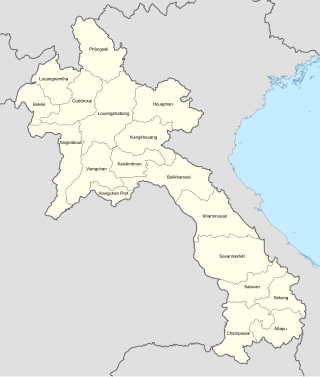
Evidence of modern human presence in the northern and central highlands of Indochina, which constitute the territories of the modern Laotian nation-state, dates back to the Lower Paleolithic. These earliest human migrants are Australo-Melanesians—associated with the Hoabinhian culture—and have populated the highlands and the interior, less accessible regions of Laos and all of Southeast Asia to this day. The subsequent Austroasiatic and Austronesian marine migration waves affected landlocked Laos only marginally, and direct Chinese and Indian cultural contact had a greater impact on the country.

Laos, officially the Lao People's Democratic Republic, is divided into 17 provinces and one prefecture, the Vientiane capital city municipality. The special administrative zone, Xaisomboun, created in 1994, was dissolved on 13 January 2006. In 2013, parts of the former special administrative zone was reestablished as Xaisomboun province.

The French protectorate of Laos was a French protectorate in Southeast Asia of what is today Laos between 1893 and 1953—with a brief interregnum as a Japanese puppet state in 1945—which constituted part of French Indochina. It was established over the Siamese vassal, the Kingdom of Luang Phrabang, following the Franco-Siamese crisis of 1893. It was integrated into French Indochina and in the following years further Siamese vassals, the Principality of Phuan and Kingdom of Champasak, were annexed into it in 1899 and 1904, respectively.

The Catholic Church in Laos is part of the worldwide Catholic Church, under the spiritual leadership of the pope in Rome. The Catholic Church is officially recognized by the government.

Christianity is a minority religion in Laos.
Statistics of Lao League in the 2000 season.
Statistics for the 2001 season of the Lao League.

The Kingdom of Vientiane was formed in 1707 as a result of the split of the Kingdom of Lan Xang. The kingdom was a Burmese vassal from 1765 to 1779. It then became a Siamese vassal until 1828 when it was annexed by Siam.
The 2004 Prime Minister's Cup was the second national football cup competition in Laos. The competition was won by Vientiane FC, who beat Savannakhet FC 2-1 in the final.
The 2006 Prime Minister's Cup was the third national football cup competition in Laos. The competition was won by Lao-American College FC who beat Lao Army FC 3–1 in the final. This was the first time the tournament had been held in two years as the 2004 edition was cancelled due to a clash with both the Laotian National Games and the 2005 Southeast Asian Games.
The 2007 Prime Minister's Cup was the fourth national football cup competition in Laos. The competition was won by MPWT FC, who beat Savannakhet FC 2–1 in the final.
The 1960 Laotian coups brought about a pivotal change of government in the Kingdom of Laos. General Phoumi Nosavan established himself as the strongman running Laos in a bloodless coup on 25 December 1959. He would be himself overthrown on 10 August 1960 by the young paratrooper captain who had backed him in the 1959 coup. When Captain Kong Le impressed the American officials underwriting Laos as a potential communist, they backed Phoumi's return to power in November and December 1960. In turn, the Soviets backed Kong Le as their proxy in this Cold War standoff. After the Battle of Vientiane ended in his defeat, Kong Le withdrew northward to the strategic Plain of Jars on 16 December 1960.

SHB Vientiane F.C. was a professional football club based in Laos that played in the Lao League, the highest division in Laotian football. The club played its home matches at the Chao Anouvong Stadium.
The 2016 Lao League is the 27th season of the Lao League, the top Laotian professional league for association football clubs, since its establishment in 1990. The season began on 26 March 2016, and is scheduled to conclude in late 2016.
The 2017 Lao League was the 28th season of the Lao Premier League. The league was composed of clubs starts on 1 April 2017. Lanexang United were the defending champions, having won their first league title in 2016.
The 2018 Lao Premier League is the 29th season of the Lao Premier League. The season started on 24 February 2018.
The 2022 Lao League is the 33rd season of the Lao League 1. Contested by 7 clubs, it operates on a system of promotion and relegation with the Lao League 2. The season started on 12 March 2022. It is played in triple round-robin format, with 21 total rounds. Due to the new policies and regulations implemented by the newly established Laos Football League Company, there will be only seven teams in the league.






